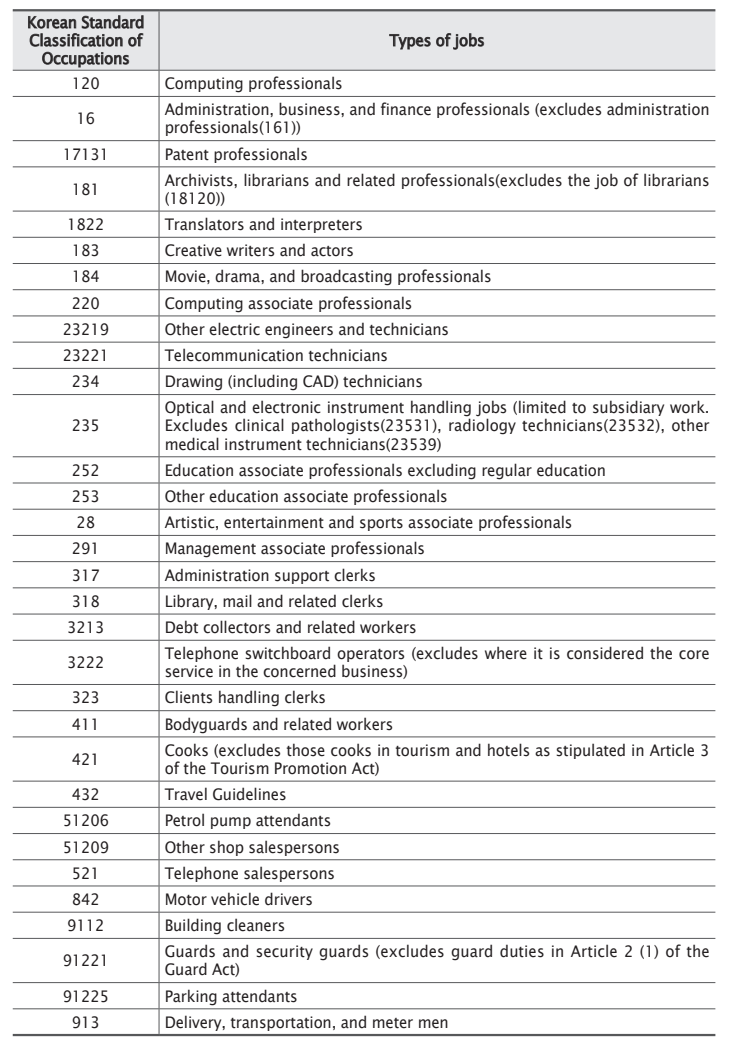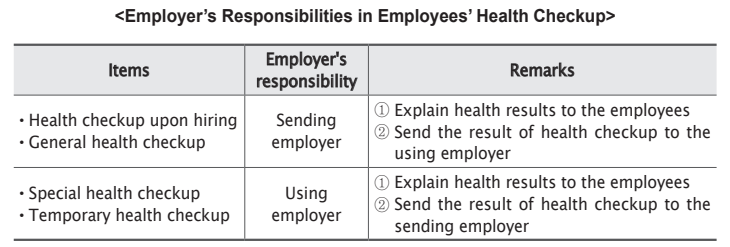Chapter 10 Irregular Employee Management
- Section 1: Types of Irregular Employees. Ⅳ. Dispatched Employees, V. Specially Hired Service Providers
-
IV. Dispatched Employees
1. Concept of worker dispatch
The term employee dispatch refers to a system in which the sending employer, while maintaining employment relations after hiring a worker, engages the worker to work for a using employer with directions and orders under a worker dispatch contract.(Article 2-1 of Act Relating to Protection, etc. for Dispatched Workers; hereinafter called Worker Dispatch Act).
1) In an outsourcing contract, one party promises to complete the work assigned and the opposite party pays remuneration for the work provided(Article 664 of the Civil Act).
2) In a commission, one party entrusts the opposite party with partial work and the opposite party accepts it(Article 680).
3) An outsourcing contract is distinguished from worker dispatch, based upon whether the contractor party or the contracted party conducts business independently or not, without comparing outsourcing contracts and commission(Notification 98-32 from the Ministry of Employment and Labor).
2. Length of dispatch period
The service period for dispatched workers shall not exceed one year. However, if an agreement is obtained by the sending employer, the using employer, and the dispatched worker, then the period may be extended only once.
The purpose of Article 6 in the Worker Dispatch Act is to treat the dispatched employee as a regularly hired employee when the using employer continues to use the dispatched employee for more than two years. It is also designed to prevent the increased use of illegally dispatched employees. Accordingly, using a dispatched employee for more than two years under the above referenced Article means that the using employer uses the same dispatched employee for more than two years. Based upon understanding of the above, if the using employer has replaced the dispatched employee with an interval period of less than two years, the using employer does not have a legal obligation to hire the dispatched employee.
In cases where the employer has utilized the same dispatched employee for more than two years, he shall be responsible for the employee not as the using employer of a dispatched employee, but as an employer under the Labor Standards Act.585)
Even if the worker was illegally dispatched, when he/she has worked for more than two years at the using employer’s company, the using employer shall employ the worker as a regular employee, in accordance with Article 6, Paragraph 3 of the Worker Dispatch Act.
3. Jobs to which the worker dispatch system applies
● Jobs available at all times
Jobs permitted for worker dispatch shall be those 32 jobs judged suitable for that purpose given their nature and the expertise, skills, or experiences they require and prescribed by Presidential Decree, but excluding direct production jobs in the manufacturing fields(Article 5(1) of the Worker Dispatch Act).
● Jobs available for a limited time
In companies where labor shortages(due to workers on leave for child birth, illness, injury) or an urgent need to temporarily/occasionally secure manpower, the worker dispatch system shall be permitted(Article 5(2) of the Worker Dispatch Act).
● Jobs where worker dispatch is not allowed (Article 5 (3) of the Act):
① Jobs performed at the construction site;
② Unloading activities in the harbor transport business;
③ Activities of seamen;
④ Hazardous and dangerous activities(Article 58 of the Occupational Safety and Health Act);
⑤ Work subject to issuance of health management pocketbooks;
⑥ Work of medical persons and medical technicians;
⑦ Driving work in the passenger vehicle transport business(city, local, and chartered buses, taxis); and
⑧ Driving work in the freight vehicle transport business.
● Restrictions on worker dispatch
Companies who are experiencing the following situations cannot dispatch workers:
① companies in which industrial disputes are taking place(Article 43 of the Trade Union Act)
② Companies in which employees are being or have just been dismissed for managerial reasons(Article 24 of the LSA).
4. Duties of the sending employer and using employer
Employee dispatch is fundamentally based on a three-way relationship between the agency employer, the using employer, and the employee. As the employee dispatch mechanism involves distinction in the hiring and using process, the responsibilities of an employer as prescribed in Labor Standards Act are divided between the sending employer and the using employer.
● Sending employer
Provided that the sending employer is the one who has hired the dispatched employee, he/ she holds the employer’s responsibility for most articles in the Labor Standards Act. That is, Chapter 2(Labor Contract), Chapter 3(Wages), wage-related articles in Chapter 4(Working Hours and Recess), labor contract and wage articles in Chapter 5(Females and Minors), and Chapter 8(Accident Compensation), where the sending employer is the employer.
● Using employer
A using employer is in charge of the dispatched employee and holds employer responsibility concerning the employee’s start and finish times, recesses, extended work, holiday, etc.
[Worker Dispatch Relations]
● Joint responsibility of sending employers and using employers
Sending and using employers shall assume joint responsibility for the following articles: Equal Treatment, Prohibition of Forced Labor, Elimination of Intermediary Exploitation, Guarantee of Exercise of Civil Rights, and Duty to Report and Attend in Chapter 1(General Provisions); Chapter 7(Apprenticeship); Chapter 11(Rules of Employment); and Chapter 12(Penal Provisions)(Article 34 of the Worker Dispatch Act).
5. Occupational Safety and Health Act
By regulating special cases related to application of the Occupational Safety and Health Act, the using employer shall be deemed an employer dispatching work to the dispatched worker for the dispatch period(Article 35).
Items Employer's responsibility Remarks
● Health checkup upon hiring
● General health checkup Sending employer ① Explain health results to the employees ② Send the result of health checkup to the using employer
● Special health checkup
● Temporary health checkup Using employer ① Explain health results to the employees ② Send the result of health checkup to the sending employer
V. Specially Hired Service Providers
1. Concept
Specially hired service providers refer to those who provide labor service on a regular basis in a specific workplace, but who are not yet recognized as employees. Typical jobs include golf-club caddies, home-study teachers, cement truck drivers, and telemarketers. They are not generally recognized as employees because they are not in a subordinate relationship with the employer due to their job characteristics, and also do not provide exclusive services to the employer. However, in recent judicial rulings, if a person is exclusively attached to one workplace, and if there is a considerable subordinate relationship with the employer, such a person can be considered an employee. Previous judgment criteria depended on whether the base pay was given, whether the four social security insurances were subscribed to, and whether income tax was paid. But as these things can be determined arbitrarily by the employer, given his or her economically superior position, determining whether someone is an employee must now be through determining whether an actual subordinate relationship to the employer has existed or not.
2. Characteristics of the Work
Whether a telemarketer who is a specially hired service provider is an employee or not is decided by how much of a subordinate relationship exists between the employer and the at-home telemarketer at the place of work. Telemarketers are usually engaged in business such as selling insurance, selling targeted real estate, distance sales, etc. Unlike a person working at a call-center, his/her main earnings are determined by their individual sales performance, so it is not entirely accurate to call such a person an employee.
In the beginning, telemarketers were handled as outsourced or commissioned labor, and no real problems existed. However, companies have gradually been using telemarketers to directly increase operational profits. In this process the company comes to supervise the telemarketer directly, which affects the telemarketer’s status as a commissioned service provider under the Civil Act to that more like an employee to which the labor laws apply. As the telemarketer’s status changes this way, employers need to handle dismissals carefully, deal with severance pay, annual leave, social security insurances, and other protections granted by Korean labor law. Accordingly, employers need to recognize that telemarketers’ status can change from commissioned service provider(under the Civil Act) to an employee(under labor law) according to the degree of employer involvement in the telemarketer’s work. When using telemarketers, it is necessary to consider in advance whether the telemarketer shall be considered self-employed or an employee exclusively supervised and directed.






